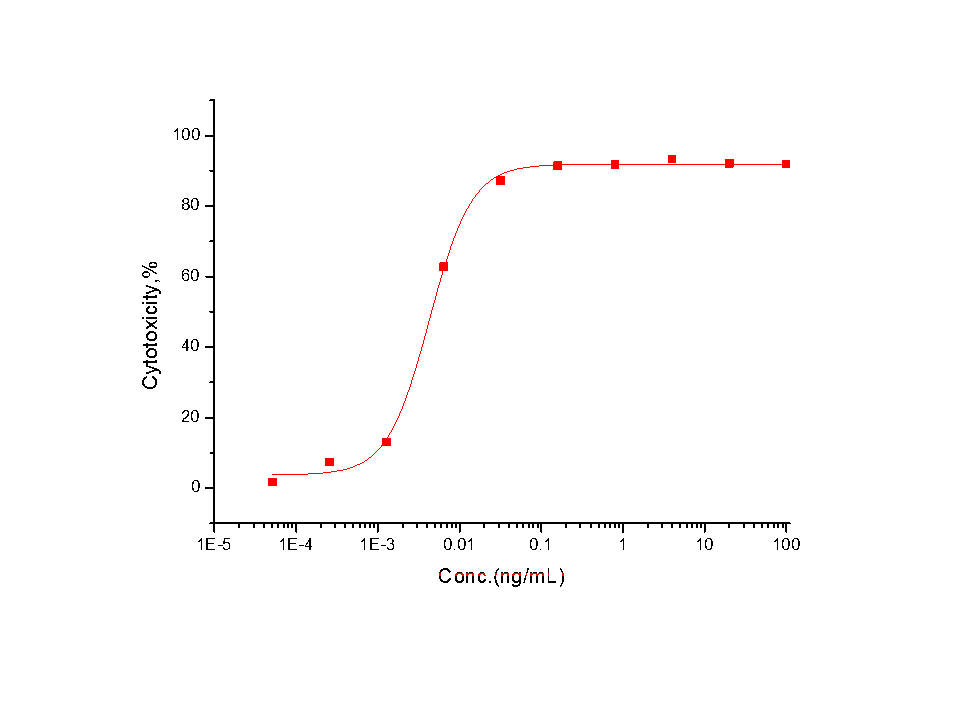- Remove All
 Your shopping cart is currently empty
Your shopping cart is currently empty
TNF beta Protein, Human, Recombinant
Lymphotoxin-alpha, also known as LT-alpha, TNF-beta, Tumor necrosis factor ligand superfamily member 1, LTA TNFSF1, and TNFB, is a secreted protein that belongs to the tumor necrosis factor family. TNF-beta/TNFSF1/Lymphotoxin alpha is highly inducible, secreted, and exists as a homotrimeric molecule. It is a cytokine that in its homotrimeric form binds to TNFRSF1A / TNFR1, TNFRSF1B / TNFBR, and TNFRSF14 / HVEM. In its heterotrimeric form with LTB, TNF-beta/TNFSF1/Lymphotoxin alpha binds to TNFRSF3 / LTBR. Lymphotoxin is produced by lymphocytes and cytotoxic for a wide range of tumor cells. TNF-beta/TNFSF1/Lymphotoxin alpha forms heterotrimers with lymphotoxin-beta which anchors lymphotoxin-alpha to the cell surface. It mediates a large variety of inflammatory, immunostimulatory, and antiviral responses. TNF-beta/TNFSF1/Lymphotoxin alpha is also involved in the formation of secondary lymphoid organs during development and plays a role in apoptosis. Genetic variations in TNF-beta/TNFSF1/Lymphotoxin alpha are a cause of susceptibility psoriatic arthritis which is an inflammatory, seronegative arthritis associated with psoriasis. It is a heterogeneous disorder ranging from a mild, non-destructive disease to a severe, progressive, erosive arthropathy.

TNF beta Protein, Human, Recombinant
| Pack Size | Price | Availability | Quantity |
|---|---|---|---|
| 100 μg | $346 | In Stock | |
| 200 μg | $613 | 7-10 days |
Product Information
| Biological Activity | Measured in a cytotoxicity assay using L929 mouse fibrosarcoma cells in the presence of the metabolic inhibitor actinomycin D. The ED50 for this effect is typically 2-10 pg/mL.  |
| Description | Lymphotoxin-alpha, also known as LT-alpha, TNF-beta, Tumor necrosis factor ligand superfamily member 1, LTA TNFSF1, and TNFB, is a secreted protein that belongs to the tumor necrosis factor family. TNF-beta/TNFSF1/Lymphotoxin alpha is highly inducible, secreted, and exists as a homotrimeric molecule. It is a cytokine that in its homotrimeric form binds to TNFRSF1A / TNFR1, TNFRSF1B / TNFBR, and TNFRSF14 / HVEM. In its heterotrimeric form with LTB, TNF-beta/TNFSF1/Lymphotoxin alpha binds to TNFRSF3 / LTBR. Lymphotoxin is produced by lymphocytes and cytotoxic for a wide range of tumor cells. TNF-beta/TNFSF1/Lymphotoxin alpha forms heterotrimers with lymphotoxin-beta which anchors lymphotoxin-alpha to the cell surface. It mediates a large variety of inflammatory, immunostimulatory, and antiviral responses. TNF-beta/TNFSF1/Lymphotoxin alpha is also involved in the formation of secondary lymphoid organs during development and plays a role in apoptosis. Genetic variations in TNF-beta/TNFSF1/Lymphotoxin alpha are a cause of susceptibility psoriatic arthritis which is an inflammatory, seronegative arthritis associated with psoriasis. It is a heterogeneous disorder ranging from a mild, non-destructive disease to a severe, progressive, erosive arthropathy. |
| Species | Human |
| Expression System | E. coli |
| Tag | Tag Free |
| Accession Number | P01374 |
| Synonyms | TNFSF1,TNFB,TNF β,lymphotoxin α,lymphotoxin alpha,LT |
| Construction | A DNA sequence encoding the mature form of human TNFβ (P01374) (Leu 35-Leu 205) was expressed and purified, with an initial Met at the N-terminus. Predicted N terminal: Met |
| Protein Purity | > 97 % as determined by SDS-PAGE  |
| Molecular Weight | 18.8 kDa (predicted); 18.8 kDa (reducing conditions) |
| Endotoxin | Please contact us for more information. |
| Formulation | Lyophilized from a solution filtered through a 0.22 μm filter, containing 50 mM Tris, pH 8.0.Typically, a mixture containing 5% to 8% trehalose, mannitol, and 0.01% Tween 80 is incorporated as a protective agent before lyophilization. |
| Reconstitution | A Certificate of Analysis (CoA) containing reconstitution instructions is included with the products. Please refer to the CoA for detailed information. |
| Stability & Storage | It is recommended to store recombinant proteins at -20°C to -80°C for future use. Lyophilized powders can be stably stored for over 12 months, while liquid products can be stored for 6-12 months at -80°C. For reconstituted protein solutions, the solution can be stored at -20°C to -80°C for at least 3 months. Please avoid multiple freeze-thaw cycles and store products in aliquots. |
| Shipping | In general, Lyophilized powders are shipping with blue ice. |
| Research Background | Lymphotoxin-alpha, also known as LT-alpha, TNF-beta, Tumor necrosis factor ligand superfamily member 1, LTA TNFSF1, and TNFB, is a secreted protein that belongs to the tumor necrosis factor family. TNF-beta/TNFSF1/Lymphotoxin alpha is highly inducible, secreted, and exists as a homotrimeric molecule. It is a cytokine that in its homotrimeric form binds to TNFRSF1A / TNFR1, TNFRSF1B / TNFBR, and TNFRSF14 / HVEM. In its heterotrimeric form with LTB, TNF-beta/TNFSF1/Lymphotoxin alpha binds to TNFRSF3 / LTBR. Lymphotoxin is produced by lymphocytes and cytotoxic for a wide range of tumor cells. TNF-beta/TNFSF1/Lymphotoxin alpha forms heterotrimers with lymphotoxin-beta which anchors lymphotoxin-alpha to the cell surface. It mediates a large variety of inflammatory, immunostimulatory, and antiviral responses. TNF-beta/TNFSF1/Lymphotoxin alpha is also involved in the formation of secondary lymphoid organs during development and plays a role in apoptosis. Genetic variations in TNF-beta/TNFSF1/Lymphotoxin alpha are a cause of susceptibility psoriatic arthritis which is an inflammatory, seronegative arthritis associated with psoriasis. It is a heterogeneous disorder ranging from a mild, non-destructive disease to a severe, progressive, erosive arthropathy. |
Dose Conversion
Calculator
Tech Support

Copyright © 2015-2025 TargetMol Chemicals Inc. All Rights Reserved.


